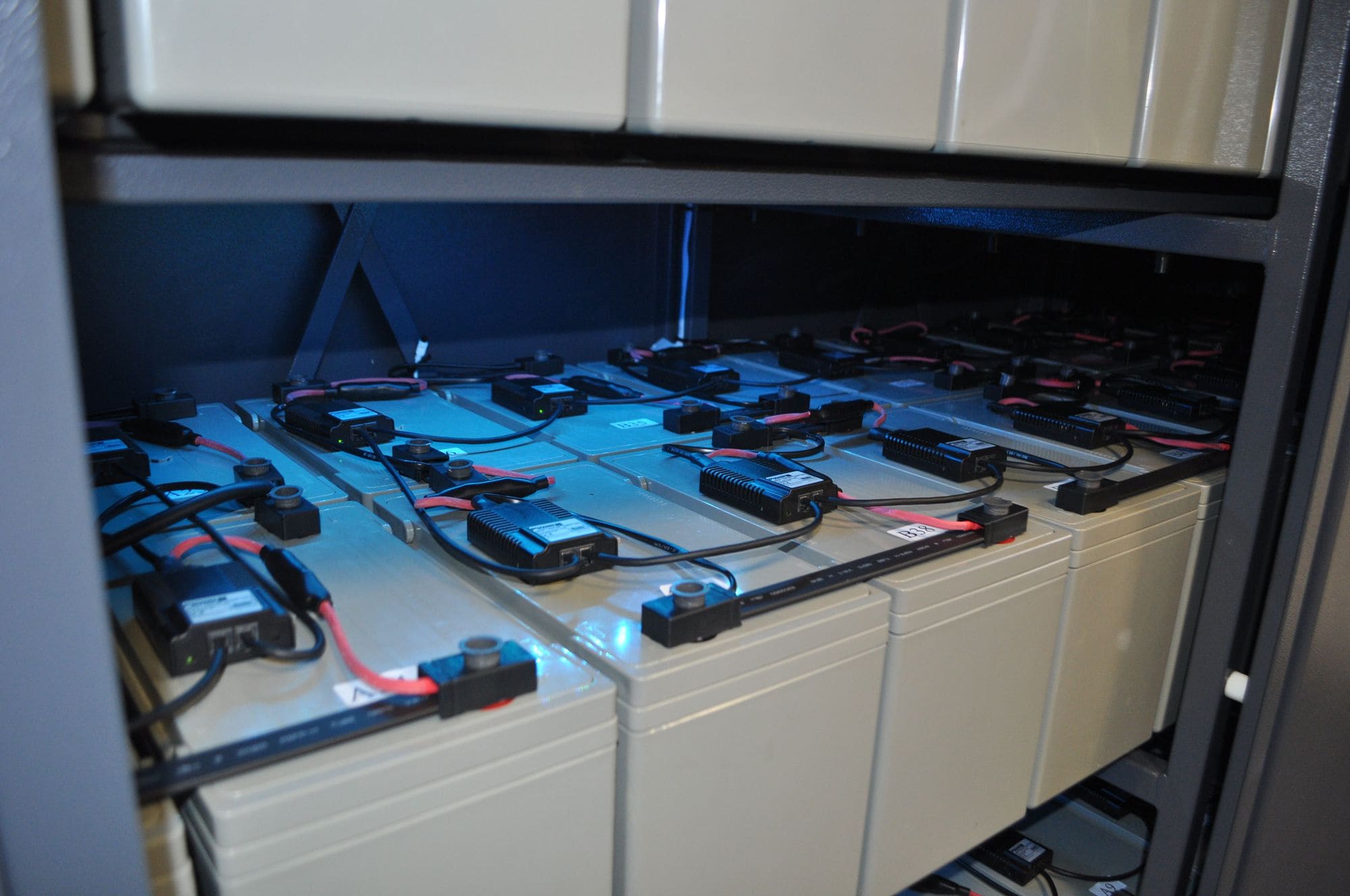How do I choose a UPS Battery?
There is no single ‘best’ UPS battery technology; each approach has its own strengths and weaknesses, and it is up to each data centre operator to choose the one that best meets their requirements. The information below outlines the 3 main types of UPS batteries and their features.
Lead-Acid UPS Battery
Why are lead acid batteries used in UPS?
Lead acid (LA) uninterruptible power supplies batteries remain popular because they have a long-proven track record for reliability. They are the most economical choice for larger power applications where weight is of little concern. These UPS battery systems provide excellent performance and efficiency with low internal impedance, high tolerance to improper treatment and attractive purchasing costs.
LA UPS batteries use an electrolyte comprising water and sulphuric acid, and plates made up of sponge lead (negative electrode) and lead oxide (positive). The two main LA uninterruptible power supply battery types are VRLA (valve-regulated lead-acid) also known as ‘sealed’ or ‘maintenance-free’ and flooded LA batteries, also called ‘vented’ or ‘open’.
Valve-Regulated Lead-Acid UPS Battery (VRLA)
VRLA UPS batteries are sealed and can be mounted in any orientation. The uninterruptible power supply battery case is equipped with a valve that vents any gas build-up to atmosphere. They normally require no direct maintenance – no water top-ups are necessary, as any hydrogen released during charging is recombined internally with oxygen to form water. There are two main VRLA types, distinguished by their electrolyte composition: Absorbed glass material (AGM), where the electrolyte is held within a highly porous microfiber glass separator; and Gel, which has an electrolyte gel made from a mixture of sulfuric acid and silica.
UPS power supply applications normally use the VRLA AGM type because of its lower internal resistance, high specific power and efficiency, low self-discharge and lower purchasing cost. AGM uninterruptible power supplies batteries also charge faster and can deliver a high current of short duration.
Flooded LA UPS batteries
Do you need to add water to flooded lead acid batteries?
Flooded LA batteries have plates that are immersed in an acid electrolyte. Since they are not sealed, the hydrogen generated during operation escapes directly into the environment, so ventilation systems must be more powerful than those for VRLA and sized adequately. In most cases, the UPS battery banks are accommodated in a dedicated room. Flooded uninterruptible power supplies batteries must be kept and operated upright, and their water levels must be manually topped up.
They provide a longer lifespan and higher reliability than sealed LA batteries. LA battery rooms must be kept at a reasonably constant temperature (20 -25°C) to avoid reducing service life or even causing damage.
Lithium-Ion UPS Batteries
In Li-ion batteries, the ‘cathode’ is usually a metal oxide, while the anode is usually porous carbon graphite. Both are immersed in a liquid electrolyte made of lithium salt and organic solvent.
Various li-ion chemistries exist, which can be simplified into six types: Lithium cobalt oxide (LCO), lithium manganese oxide (LMO), lithium-nickel manganese cobalt oxide (NMC), lithium iron phosphate (LFP), nickel cobalt alumina (NCA), lithium titanium oxide (LTO). Choosing between these depends on several factors and precise comparison is not possible, since many aspects such as mechanical from, cell size and active material mix, play a significant role in performance.
What are the differences between lithium ion and lead acid batteries in UPS?
Li-ion UPS batteries are becoming an increasingly attractive alternative to LA in data centre operations, where power availability has absolutely the highest priority, they offer higher reliability than VRLA solutions. Not only is each individual cell inherently safer and more stable, but each uninterruptible power supply battery module has an electronic controller that continuously checks every cell for any sign of change in performance.
Single cell temperature, current, voltage and charge status are all monitored at the cabinet level to provide a clear overview of current uninterruptible power supply battery status and to predict future runtime and performance. Lithium-ion UPS batteries can be charged much more quickly than conventional batteries, offer more discharge/recharge cycles than traditional batteries and provide higher power density and efficiency, especially under heavy discharge rates. This eliminates battery oversizing, while much less real estate is needed for the battery installation. Although VRLA initial purchase prices are lower, Li-ion UPS battery operating life is at least double that of VRLA equivalents, so reducing the overall capital cost. The labour costs associated with UPS battery removal and replacement are also reduced. Li-ion produces less waste heat, which in turn lowers cooling costs and creates a smaller carbon footprint.
Nickel-Cadmium UPS Batteries
Nickel-cadmium (NiCd) UPS battery electrodes comprise nickel hydroxide (positive plate) and cadmium hydroxide (negative plate). NiCd uninterruptible power supplies batteries provide a very long calendar life (up to 20 years) and can cope with temperature extremes (-20°C to +40 °C). They also offer a high cycle life and have good tolerance to deep discharges. Other benefits relate to the low internal resistance, which offers high power density combined with fast-charging capability. NiCd batteries offer long storage times, and provide high protection against improper treatment.
Why are nickel cadmium batteries not used in UPS systems?
NiCd UPS batteries cost much more than traditional VRLA equivalents. Furthermore, as both nickel and cadmium are toxic, UPS battery disposal/recycling processes are costly. NiCd uninterruptible power supplies batteries also require maintenance in the form of topping up with water – especially in high-cycle applications, or under heavy charging rates with some charging methodologies.
If you require more information on our UPS battery services or any of our uninterruptible power supplies products please use our contact page or call 0800 731 3269.





